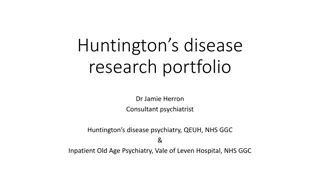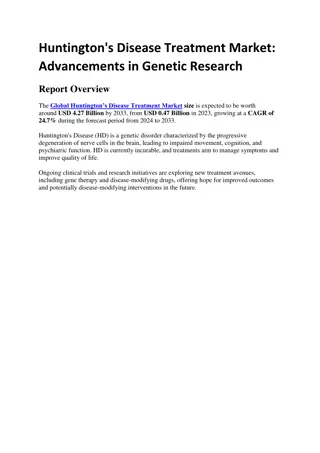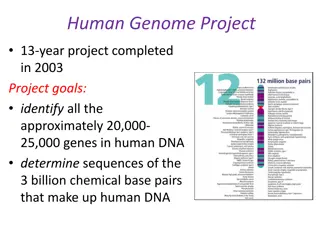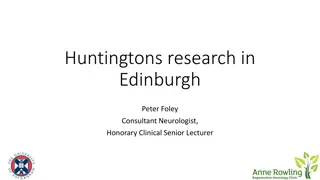Huntington’s Huntington’s
Huntington's disease, also known as Huntington's chorea, is a genetic disorder that affects nerve cells in the brain. It is characterized by cognitive, muscular, behavioral, psychological, and mood-related symptoms. Individuals with Huntington's disease experience involuntary movements, muscle problems, and cognitive decline. This condition poses challenges in daily activities and requires specialized care and management. Learn more about the causes, symptoms, and effects of Huntington's disease to understand its impact on individuals and families.
Download Presentation

Please find below an Image/Link to download the presentation.
The content on the website is provided AS IS for your information and personal use only. It may not be sold, licensed, or shared on other websites without obtaining consent from the author.If you encounter any issues during the download, it is possible that the publisher has removed the file from their server.
You are allowed to download the files provided on this website for personal or commercial use, subject to the condition that they are used lawfully. All files are the property of their respective owners.
The content on the website is provided AS IS for your information and personal use only. It may not be sold, licensed, or shared on other websites without obtaining consent from the author.
E N D
Presentation Transcript
Huntingtons Huntington s Disease Disease BY: SAM DAVIS, SABRINA TRAN, MYA LUNA, MYLES BY: SAM DAVIS, SABRINA TRAN, MYA LUNA, MYLES BLACKWELL AND EAMONN DUENSING BLACKWELL AND EAMONN DUENSING
Huntingtons Disease Huntington s Disease o The Huntington disease was named for George Huntington oHe was the first physician to described this disease in 1872 o Huntington Disease used to be known as Huntington Chorea oHuntington was found at East Hampton, Long Island o is
Type of Genetic Disorder Type of Genetic Disorder Inherited condition in which nerve cells in the brain break down overtime. (affects mobility) It s rare, with fewer than 200,000 US cases per year Usually starts in a person in 30 s or 40 s Every child of someone who has HD has a 50/50 chance of also getting the disorder/disease.
Graphic of Huntingtons Graphic of Huntington s Disease Disease
Symptoms of Disorder Symptoms of Disorder Cognitive: amnesia, delusion, lack of concentration, memory loss, mental confusion, slowness in activity and thought, or difficulty thinking and understanding Muscular: abnormality walking, increased muscle activity, involuntary movements, problems with coordination, loss of muscle, or muscle spasms Behavioral: compulsive behavior, fidgeting, irritability, or lack of restraint Psychological: delirium, depression, hallucination, or paranoia Mood: anxiety, apathy, or mood swings Also common: tremor, weight loss, or impaired voice
Effects of Disorder Effects of Disorder Huntington s disease is when you have almost no control over your movements Involuntary jerking or writhing movements (chorea) Muscle problems, such as rigidity or muscle contracture (dystonia) Slow or abnormal eye movements. The disease destroys cells in the basal ganglia, the part of the brain that controls movement, emotion, and cognitive ability.
Diagnosis of Individual Diagnosis of Individual Q: Explain how doctors determine a person has the disorder? A: Doctors have to do tests, and exams. They check if any problems is causing your symptoms, and check for any related complications. Q: How does family medical get caused over tends weeks and months? A: It reviews on your family medical history, and Neurological and Sympatric examinations. Check the blood from HIV Antibodies. Takes 8 weeks for your body to produce antibodies, but in some cases it can take up six months.
Life expectancy and limitations Life expectancy and limitations Life expectancy can change between how bad the symptom's are. Once diagnosed with HD patients can live from 10 to 30 years more depending on symptom severity. With HD you have limited mobility. Also you may lose the ability to speak clearly. Living with someone who has HD can be emotionally upsetting because sometimes the family has to make a difficult choice.
Treatment and Medication Treatment and Medication Huntington cannot be cured but treatment can help. Physical therapy and talk therapy can help manage symptoms. Physical therapist: Restores muscle strength and function through exercise. Neurologist: Treats nervous system disorders. Psychiatrist: Treats mental disorders primarily with medications. Primary care provider (PCP): Prevents, diagnoses, and treats diseases. Medical geneticist: Diagnoses and manages hereditary disorders
Current Research Current Research Baltimore Huntington's Disease causes brain disorder, that causes uncontrolled movements, emotional problems, and loss of thinking ability. HD is an inherited disorder that causes degeneration of brain cells
2 2nd nd Graphic Disorder Graphic Disorder
Summary Summary In conclusion Huntington's Disease is a disease that occurs in the brain. The disease slowly breaks down nerve cells causing a decrease in mobility (movement). It also effects the ability to speak. It usually occurs in someone s 30 s or 40 s. HD patients can live from 10 to 30 years depending on symptom severity.
Works Cited Page Works Cited Page http://hubpages.com/health/Huntingtons-Disease-Life-Expectancy www.google.com/webhp?sourceid=chrome- instant&ion=1&espv=2&ie=UTF- 8#q=what%20is%20huntington%27s%20disease http://hdsa.org/what-is-hd/ Dr. Chen-kung Ding http://www.ninds.nih.gov/disorders/huntington/huntington.htm















